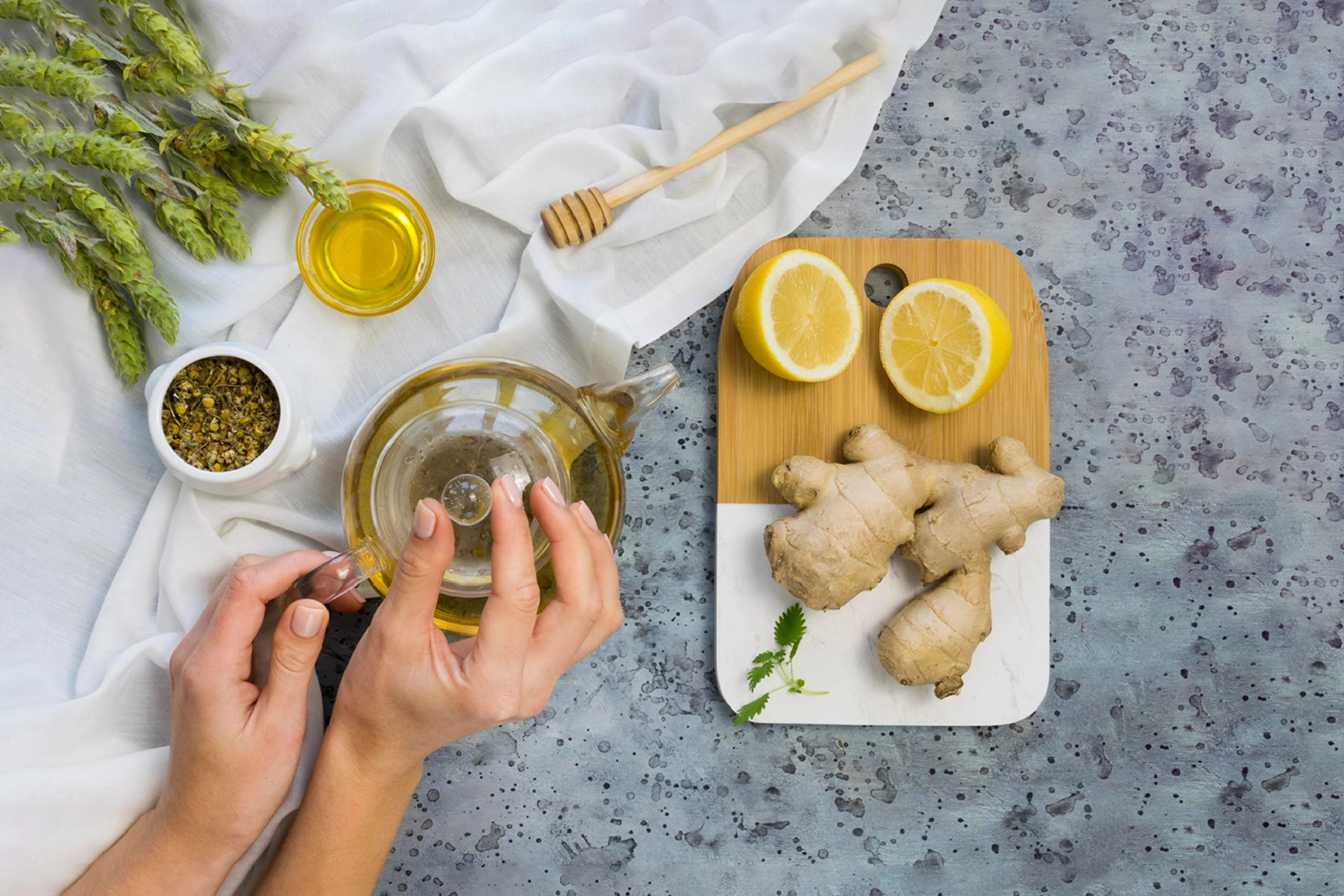Ayurveda | 6 min read
Ayurvedic Remedies for Asthma Treatment at Home
Medically reviewed by
Table of Content
Key Takeaways
- Around 262 million people have signs and symptoms of asthma
- Coughing, wheezing, and gasping breath are symptoms of asthma
- Ginger, garlic, and turmeric are some home remedies for asthma
Asthma is a non-communicable disease affecting all age groups and is the most common chronic disease among children. In 2019, around 262 million people all over the world had asthma [1]. Inflammation in the airways causes this health disorder. Your airways become narrower with mucus blocking the airflow. This triggers certain symptoms of asthma such as:
Wheezing
Coughing
Gasping breath
Shortness of breath
There are many risk factors that can trigger or cause asthma apart from genetics. They include:
Smoking
Obesity
Asthma doesn’t pose harm to everyone but can make some patients more vulnerable. In case of an asthma attack, treatment options such as medications and inhalers can provide relief. Home remedies for asthma may also ease your symptoms. They work best when taken alongside your usual asthma medications. Read on for some ayurvedic health tips for managing asthma.
Ayurvedic Treatment For Asthma
Nightshade/Kanteli
7 to 14 ml of juice prepared from the fruits of the Nightshade with yellow berries or from the whole plant can be eaten twice a day to alleviate and soothe asthma symptoms. It is called Kanteli in Hindi, Kantakari in Sanskrit.
Curcumin
The yellow ingredient that gives turmeric its colour has a number of pharmacological and antioxidant properties, one of which is its capacity to inhibit inflammation. This makes it an essential herb in the battle against bronchial asthma.
Black Raisin
Make a paste using dates, long Pippali, black resin, and honey in equal amounts. Then, to lessen the likelihood of asthma attacks, take a teaspoon of that paste in warm milk every morning and evening.
Mustard Oil
Massaging or rubbing brown mustard oil on the patient's chest is a common natural asthma treatment. It offers comfort during an attack.
Ginger
A study found that supplements of ginger can ease symptoms of asthma [2]. Ginger is an herb that has anti-inflammatory properties. A cup of ginger tea mixed with crushed garlic can prove to be effective in clearing your airways by releasing mucus. This further helps in asthma attack treatment. You can eat ginger daily to gain from its medical benefits or add it to your dishes while cooking. During winters, add ginger to your tea.
Additional Read: Home Remedies For Acid Reflux

Garlic
In patients who display signs of asthma, the surrounding parts of airways become swollen. Under such circumstances, garlic can help relieve or reduce swelling. Besides improving the smell and taste of food, garlic also offers many health benefits. Adding garlic to your food will help soothe and open up the airways. A study found that garlic has anti-inflammatory properties that may help relieve symptoms of asthma [3].
Honey
Honey is often used in cold remedies. It helps soothe the throat and reduces or prevents coughing. Consume honey during winters to prevent colds as coughing can worsen symptoms of asthma. Mix honey with hot herbal tea or consume a spoonful of it every morning along with tulsi leaves. This is one of the effective home remedies of asthma to provide relief for your symptoms.
Turmeric
Turmeric is a spice used very often in Indian meals. It is known for its anti-inflammatory and anti-allergy properties. As you know, allergies can worsen the symptoms of asthma . Turmeric affects histamines that cause inflammation. Thus, it can relieve signs of asthma and prevent attacks. So, use this spice in cooking, but make sure you use organic turmeric powder or fresh turmeric that you powder yourself. You can also prepare turmeric and ginger tea. Drinking this twice a day can reduce the frequency of asthma attacks.
Licorice
Mainly found in parts of Europe and Asia, licorice is an herb that is used as medicine and added to food for flavor. It is known as mulethi and is rich in anti-inflammatory properties. Drinking tea made with half a teaspoon of licorice and half a teaspoon ginger can help you manage the symptoms of asthma .
Bay leaf
This aromatic leaf is often used in cooking for flavor and fragrance. It can be used in its raw or dry form. It is believed that adding half a teaspoon of bay leaf and ¼ teaspoon of pippali to 1 teaspoon of honey and consuming it two to three times a day helps keep asthma issues at bay.
Omega-3 oils
Found in fish and flax seeds, omega-3 fatty oil offers many health benefits. It is said to reduce inflammation in the airways and improve lung function in people with severe asthma. However, it is better to consult with your doctor before taking the supplements as a high dosage can block the beneficial effects of omega-3 oils.
Caffeine
A study found that caffeine is effective for people with symptoms of asthma [4]. It may improve the function if your airways and its effects remain for up to four hours after consumption. Caffeine is a bronchodilator. This means it can also reduce fatigue of your respiratory muscle.
Additional Read: Ayurvedic Treatment for Cold and Cough
How to Treat Asthma as Per Ayurveda?
Asthma, according to Ayurveda, is caused by an imbalanced Kapha, Pitta Dosha, and has symptoms such as wheezing, coughing, fever, and irritability. [1] Wheezing, thirst, dry skin, dry cough, anxiety, and constipation are symptoms of asthma brought on by the Vata Dosha.
The two most popular Panchakarma techniques—Varechana and Vamana—are particularly efficient Ayurveda treatments for asthma.
Vamana
The patient ate Vamana herbs such as liquorice, sweet flag, and emetic nut for their properties to induce therapeutic vomiting, which eliminates the Dosha imbalance in the upper gastrointestinal tract.
Virechana
The patient takes herbal cleansing solutions that remove toxins through the anal route.
Rasayana Treatment
Patients receive oral medications and diet instructions after Panchakarma therapy. Rasayana therapy strengthens immunity, prevents recurrence, restores normal bodily function, and aids in fighting the disease for a long time.
Which is the Best Ayurvedic Asthma Medicine?
Polyherbal combinations are among the most widely used, secure, and successful methods of treating breathing issues. In addition, herbal remedies are one of the most often used supplemental treatment modalities.
Many herbal combinations to treat respiratory problems have been described by Ayurveda. For example, asthma is treated using herbs with a hot potency and pacifying effects on Vata and Kapha.
Herbs and herbomineral formations used to treat asthma are as follows:
- Jyesthimadhu (Glycyrrhiza glabra)
- Haridra (Curcuma longa)
- Vasa (Adhatoda vasica)
- Lavang (Syzygium aromaticum)
- Elaichi (Elettaria cardamomum)
- Pippali (Piper longum)
- Tulasi (Ocimum sanctum)
- Sunth (Zingiber officinale)
- Shwaskuthar Rasa
- Abhrak Bhasma
These herbs help in improving breathing by reducing inflammation and widening the airways. Speaking with your Ayurveda doctor will help you determine which treatment options and medications are best for you.
Knowing what is asthma as well as asthma symptoms and treatment will help you control your triggers and enjoy a healthy life. When dealing with this issue, keep in mind that there is no alternative to proper medical care. Home remedies can offer relief, but they are temporary. Seek medical help if you experience any serious symptoms of asthma . You can book an online doctor appointment on Bajaj Finserv Health and consult with specialists immediately.
References
- https://www.who.int/news-room/fact-sheets/detail/asthma
- https://www.atsjournals.org/doi/full/10.1165/rcmb.2012-0231OC
- https://www.sciencedirect.com/science/article/abs/pii/S0278691513002287?via%3Dihub
- https://pubmed.ncbi.nlm.nih.gov/11687099/
Disclaimer
Please note that this article is solely meant for informational purposes and Bajaj Finserv Health Limited (“BFHL”) does not shoulder any responsibility of the views/advice/information expressed/given by the writer/reviewer/originator. This article should not be considered as a substitute for any medical advice, diagnosis or treatment. Always consult with your trusted physician/qualified healthcare professional to evaluate your medical condition. The above article has been reviewed by a qualified doctor and BFHL is not responsible for any damages for any information or services provided by any third party.





